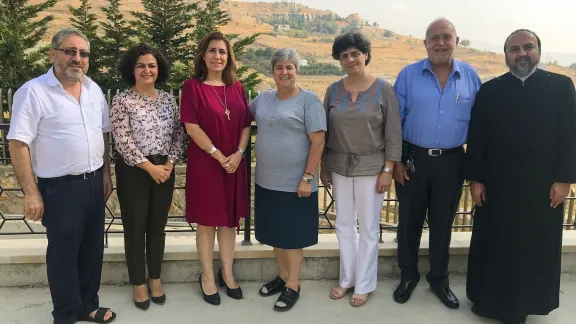
Members of the Middle East Council of Churchesâ commission, including Fr Gaby Hachem (first on left) and Dr Souraya Bechealany (third from right), who drew up the resources for Christian Unity Week. Photo: MECC
The Middle East Council of Churches offers reflections on the journey of the Magi for ecumenical Week of Prayer
(LWI) - A message of hope amid challenges facing churches throughout the Middle East is at the heart of this year’s reflections for the Week of Prayer for Christian Unity. The annual octave of prayer is marked by Christians of all denominations from 18 to 25 January, or alternatively around the feast of Pentecost by some churches in the southern hemisphere.
The 2022 reflections and liturgical materials have been drawn up by the Beirut-based Middle East Council of Churches (MECC), in cooperation with the World Council of Churches and the Pontifical Council for the Promotion of Christian Unity. They are based on the words of the Magi in Matthew’s Gospel: “We saw the star in the East and we came to worship him.”
Former MECC General Secretary, Dr Souraya Bechealany who worked on preparing the texts, says it is important to be “realistic” about the political problems, economic hardships and demographic decline of the Christian communities in the Middle East, compounded by the COVID-19 pandemic which has affected churches across the world. At the same time, she says, “to be Christian in this region is to be a witness to the hope of Resurrection that Christ came to bring to the world.”
A presence for all people
Bechealany is a theologian, ecumenist and university professor specializing in the Christian presence in the region. She was also the first woman to hold the post of leader of the MECC which represents all of the 27 different churches of the Middle East and maintains dialogue with the majority Muslim communities. “Despite our numbers,” Bechealany insists, “our continuing presence here means that we are a presence for others and therefore our concern is for the dignity and human rights of all people in the region.”
In preparing the resources, Bechealany worked together with Fr Gabriel Hachem who heads the MECC’s theological and ecumenical department. He explains that the focus on the Epiphany story “reflects the specificity of our region” where the Revelation of Christ to the world has traditionally been a more significant celebration than the nativity of Christ. The feast of Christmas is marked only by Western churches in Bethlehem on 25 December, while all churches, including Orthodox and Armenians, celebrate the manifestation of Christ on 6 January.
Fr Hachem, a member of the Catholic Church’s International Theological Commission and editor-in-chief of the pioneering ecumenical magazine Proche-Orient Chrétien, notes that the story of the Magi represents “the synodal journey” of the whole of humanity. “Christ is the light that comes from the East,” he stresses, therefore the reflections do not seek “to lament or deplore our difficult situation” but to highlight the hope that springs from “common adoration” of the Christ Child.
All are enriched by shared treasures
“We live in this hope,” notes Prof. Dr Dirk Lange, the Lutheran World Federation’s Assistant General Secretary for Ecumenical Relations. “The work of the MECC has focused our attention on the journey we make together, in a common adoration of the Christ Child and in solidarity with those suffering. We are reminded of the rootedness of faith in common prayer, that can both reshape the way we do things as churches and direct us out into the world in hope.”
The introductory text for Christian Unity week also underlines the way the Magi represent diverse cultures and “reveal to us the unity of all nations desired by God.” The mission of Christians is to be a sign like the star, to guide humanity in its hunger for God, to lead all to Christ and to be the means by which God is bringing about the unity of all peoples,” it says. When Christians gather together and “open their treasures [….] all are enriched” as the insights of different traditions are shared.
A word of hope is needed more than ever for people in this region.
On a practical level, Fr Hachem said, the pandemic caused severe challenges for the eight members of the commission charged with drawing up the texts. They represented the four “families” – Catholic, Evangelical, Orthodox and Oriental Orthodox - which make up the mosaic of Christian communities in the Middle East. Unable to meet all together in person, they held hours of discussions online (often with unreliable internet connections) to write the original texts in Arabic.
Continued physical distancing restrictions will also mean smaller gatherings and services to mark Christian Unity Week in the Middle East, as in other parts of the world. But Fr Hachem insists that “a word of hope is needed more than ever for people in this region” who continue “to suffer from injustice and to seek a better future for their children elsewhere.” The hope of the authors is that Christians “can be enlightened by the star and find new awareness of their vocation to be a voice for freedom, human rights and prosperity” for all people in this region and beyond.
LWF/P.Hitchen
The LWF engages in bilateral, trilateral and multilateral dialogues and practical cooperation with many other Christian churches and world communions. In this interview series we profile some of those ecumenical partnerships, highlighting past progress and current challenges on the road towards full Christian unity.
The resources for the Week of Prayer for Christian Unity are freely available for download and use by churches or individuals in English, French, Spanish, German, Portuguese, Italian and Arabic.


